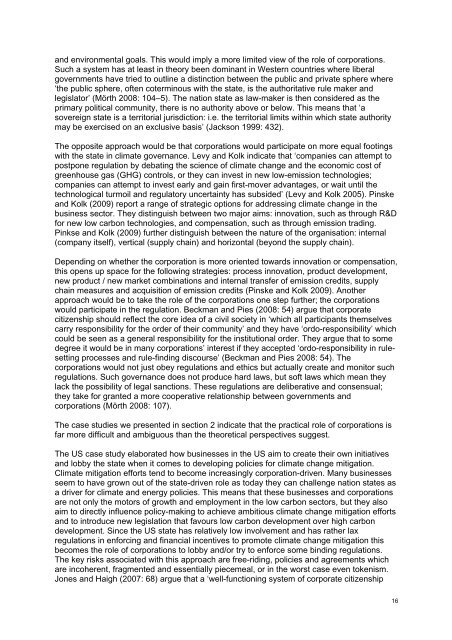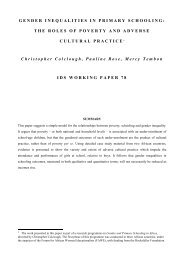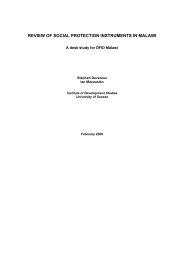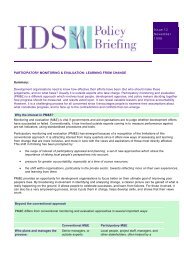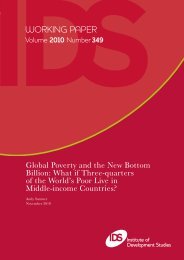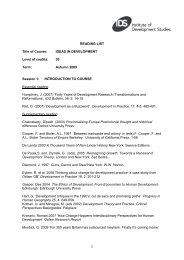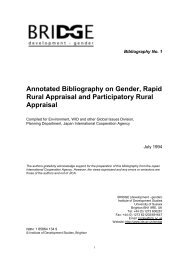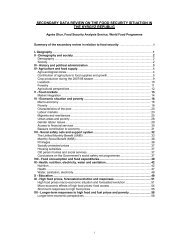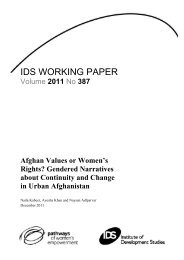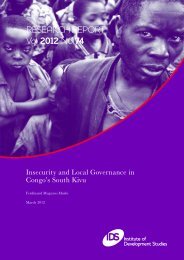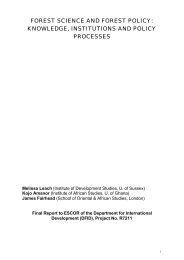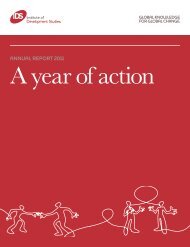IDS WORKING PAPER - Institute of Development Studies
IDS WORKING PAPER - Institute of Development Studies
IDS WORKING PAPER - Institute of Development Studies
Create successful ePaper yourself
Turn your PDF publications into a flip-book with our unique Google optimized e-Paper software.
and environmental goals. This would imply a more limited view <strong>of</strong> the role <strong>of</strong> corporations.<br />
Such a system has at least in theory been dominant in Western countries where liberal<br />
governments have tried to outline a distinction between the public and private sphere where<br />
‘the public sphere, <strong>of</strong>ten coterminous with the state, is the authoritative rule maker and<br />
legislator’ (Mörth 2008: 104–5). The nation state as law-maker is then considered as the<br />
primary political community, there is no authority above or below. This means that ‘a<br />
sovereign state is a territorial jurisdiction: i.e. the territorial limits within which state authority<br />
may be exercised on an exclusive basis’ (Jackson 1999: 432).<br />
The opposite approach would be that corporations would participate on more equal footings<br />
with the state in climate governance. Levy and Kolk indicate that ‘companies can attempt to<br />
postpone regulation by debating the science <strong>of</strong> climate change and the economic cost <strong>of</strong><br />
greenhouse gas (GHG) controls, or they can invest in new low-emission technologies;<br />
companies can attempt to invest early and gain first-mover advantages, or wait until the<br />
technological turmoil and regulatory uncertainty has subsided’ (Levy and Kolk 2005). Pinske<br />
and Kolk (2009) report a range <strong>of</strong> strategic options for addressing climate change in the<br />
business sector. They distinguish between two major aims: innovation, such as through R&D<br />
for new low carbon technologies, and compensation, such as through emission trading.<br />
Pinkse and Kolk (2009) further distinguish between the nature <strong>of</strong> the organisation: internal<br />
(company itself), vertical (supply chain) and horizontal (beyond the supply chain).<br />
Depending on whether the corporation is more oriented towards innovation or compensation,<br />
this opens up space for the following strategies: process innovation, product development,<br />
new product / new market combinations and internal transfer <strong>of</strong> emission credits, supply<br />
chain measures and acquisition <strong>of</strong> emission credits (Pinske and Kolk 2009). Another<br />
approach would be to take the role <strong>of</strong> the corporations one step further; the corporations<br />
would participate in the regulation. Beckman and Pies (2008: 54) argue that corporate<br />
citizenship should reflect the core idea <strong>of</strong> a civil society in ‘which all participants themselves<br />
carry responsibility for the order <strong>of</strong> their community’ and they have ‘ordo-responsibility’ which<br />
could be seen as a general responsibility for the institutional order. They argue that to some<br />
degree it would be in many corporations’ interest if they accepted ‘ordo-responsibility in rulesetting<br />
processes and rule-finding discourse’ (Beckman and Pies 2008: 54). The<br />
corporations would not just obey regulations and ethics but actually create and monitor such<br />
regulations. Such governance does not produce hard laws, but s<strong>of</strong>t laws which mean they<br />
lack the possibility <strong>of</strong> legal sanctions. These regulations are deliberative and consensual;<br />
they take for granted a more cooperative relationship between governments and<br />
corporations (Mörth 2008: 107).<br />
The case studies we presented in section 2 indicate that the practical role <strong>of</strong> corporations is<br />
far more difficult and ambiguous than the theoretical perspectives suggest.<br />
The US case study elaborated how businesses in the US aim to create their own initiatives<br />
and lobby the state when it comes to developing policies for climate change mitigation.<br />
Climate mitigation efforts tend to become increasingly corporation-driven. Many businesses<br />
seem to have grown out <strong>of</strong> the state-driven role as today they can challenge nation states as<br />
a driver for climate and energy policies. This means that these businesses and corporations<br />
are not only the motors <strong>of</strong> growth and employment in the low carbon sectors, but they also<br />
aim to directly influence policy-making to achieve ambitious climate change mitigation efforts<br />
and to introduce new legislation that favours low carbon development over high carbon<br />
development. Since the US state has relatively low involvement and has rather lax<br />
regulations in enforcing and financial incentives to promote climate change mitigation this<br />
becomes the role <strong>of</strong> corporations to lobby and/or try to enforce some binding regulations.<br />
The key risks associated with this approach are free-riding, policies and agreements which<br />
are incoherent, fragmented and essentially piecemeal, or in the worst case even tokenism.<br />
Jones and Haigh (2007: 68) argue that a ‘well-functioning system <strong>of</strong> corporate citizenship<br />
16


